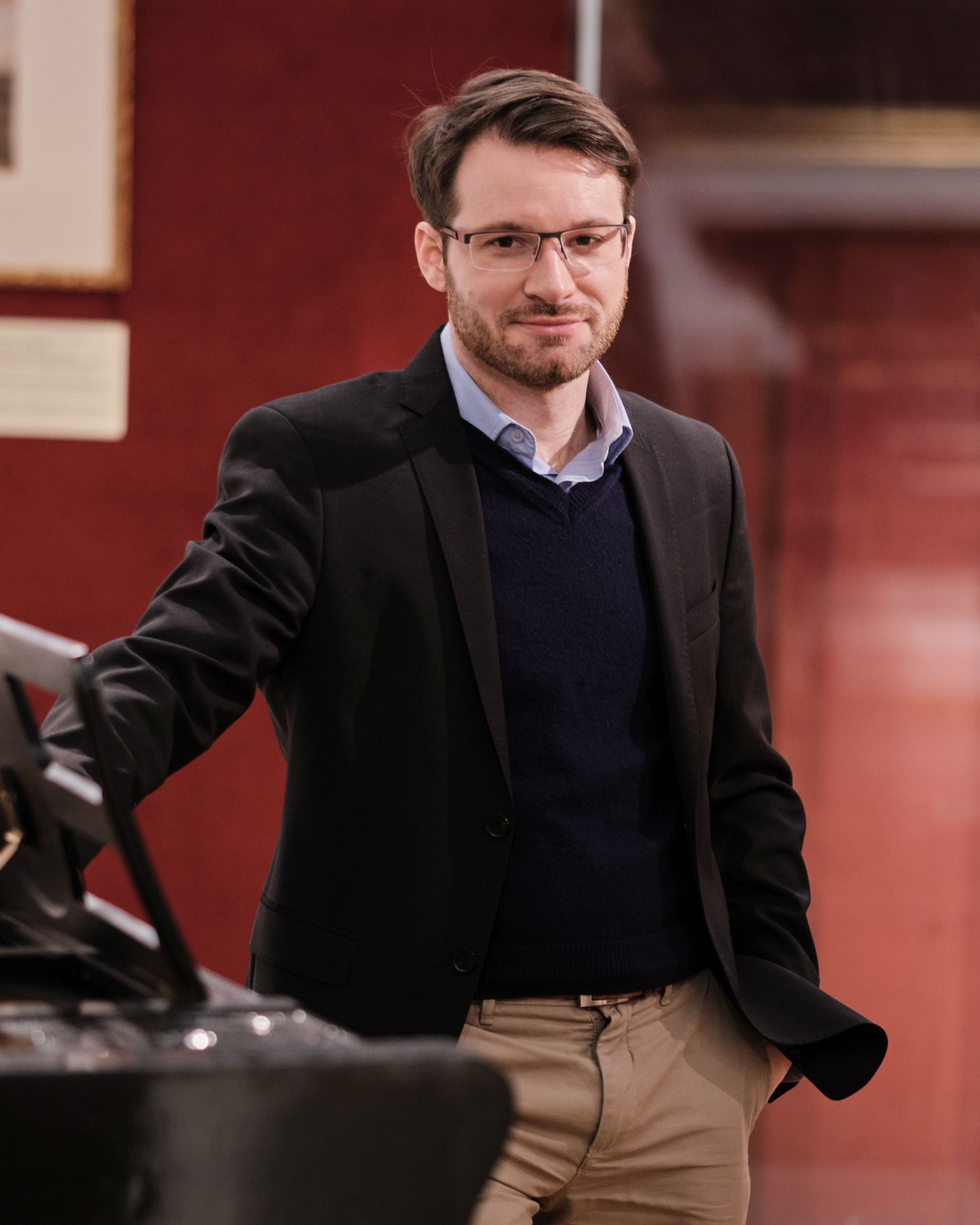|
Rudolf Gusztin, Research Assistant, Department for Hungarian Music History of the Institute for Musicology, Research Centre for the Humanities, Hungarian Academy of Sciences, and PhD student at the Liszt Ferenc University for Music, Musicology (supervisor: Katalin Kim Szacsvai). His doctoral thesis in preparation deals with the 19th-century choral-movement in Hungary. |
CV
Rudolf Gusztin graduated in 2016 from the Musicology Department of the Liszt Academy of Music (Budapest). His research areas include 19th- and -20th-century Hungarian music history and music theory. Since May 2016, he has been employed first as scientific administrator, later as research assistant at the Department for Hungarian Music History (Institute of Musicology, RCH, HAS). He participates at the preparations and editing activities of the Department’s series of critical editions and scientific publications (Ferenc Erkel’s Operas, Műhelytanulmányok a 18. Század Zenetörténetéhez [Studies for 18th-Century Music History]) as well as at the Department’s activity of data processing, cataloguing of basic research for the 18th and 19th centuries. His research area has been enlarged with his planned PhD dissertation on the 19th-century choral-movement in Hungary.
Publications
Theses:
Zárlatok összhangzattani elemzése Liszt kései műveiben [A Harmonic Analysis of the Cadences in the Late Works of Franz Liszt]. BA thesis (Budapest, Liszt Ferenc Academy of Music, Musicology Department, 2014).
Kultúrpolitika és diktatúra: a jazz megítélése a kádári konszolidáció idején (1956–1963) [Cultural Policy and Dictatorship: How Jazz was viewed in the Period of Consolidation of the Kádár Regime (1956–1963)]. MA thesis (Budapest, Liszt Ferenc Academy of Music, Musicology Department, 2016).
Article:
„Kultúrpolitika és diktatúra: a jazz megítélése a kádári konszolidáció idején (1956–1963)” [Cultural Policy and Dictatorship: How Jazz was viewed in the Period of Consolidation of the Kádár Regime], Magyar Zene 56/1 (2018), 102–115.
Editorial work:
Ágnes Sas: Polyphonic Music in the Cities, Churches and Aristocratic Courts of Hungary, ed. by Katalin Szacsvai-Kim, copy-editors Lili Békéssy, Rudolf Gusztin, Pál Horváth, Zoltán Vargyas (Budapest, HAS Institute for Musicology of the Research Centre for the Humanities, 2017).
Conference papers:
Choral Movement in Nineteenth-century Hungary: A Means of Expressing National Identity Through Music. Lecture at the conference “Musical culture/s of the Habsburg Monarchy and its successors states: Cultural, social and historical approaches”, 23–24 February 2017, Vienna, Department of Music Analysis, Theory and History – University of Music and Performing Arts Vienna.
A magyar dalármozgalom intézményesülése az 1860-as években [The Institutialization of the Hungarian Choral-movement in the 1860s]. Lecture at the conference „Hivatásosok és műkedvelők” [Professionals and Dillentats], 13–14 October 2017, Budapest, Hungarian Musicological Society.
A dalármozgalom repertoárja az első évtizedben [The Repertoire of the Hungarian Choral-movement in its First Decade]. Lecture at the conference „Hivatásosok és műkedvelők” [Professionals and Dillentats], 12–13 October 2018, Budapest, Hungarian Musicological Society.
„A dalármozgalom századfordulós forrásainak értékelése” [Evaluation of the Turn-of-the-century Sources of the Choral-movement], Lecture at the conference „A 20. századi zenetörténeti források hitelessége” [The authenticity of 20th century music history sources], 28–29 May 2019. Budapest, HAS Institute for Musicology of the Research Centre for the Humanities, Archives for 20th–21st Century Hungarian Music
„Önkényuralom és zene: A dalármozgalom és a politika viszonya az 1850–60-as években” [Dictatorship and Music: The Relationship Between the Choral-movement and Politics in the 1850s and 60s.], Lecture at the „Zene és politika” [Music and Politics], 11–12 October 2019, Budapest, Hungarian Musicological Society.
„Choral Movement in Nineteenth-Century Hungary – A Means of Expressing National Identity through Music”, Lecture at the conference „Music, Arts and Politics: Revolutions and Restorations in Europe and Croatia. 1815-1860”, 16–19 October 2019, Croatian Musicological Society & Croatian Institute for History, Department for History of Croatian Music of the Croatian Academy of Sciences and Arts; Croatian Academy of Sciences and Arts, Library.
Full list of publications: Hungarian Scientific Bibliography.



